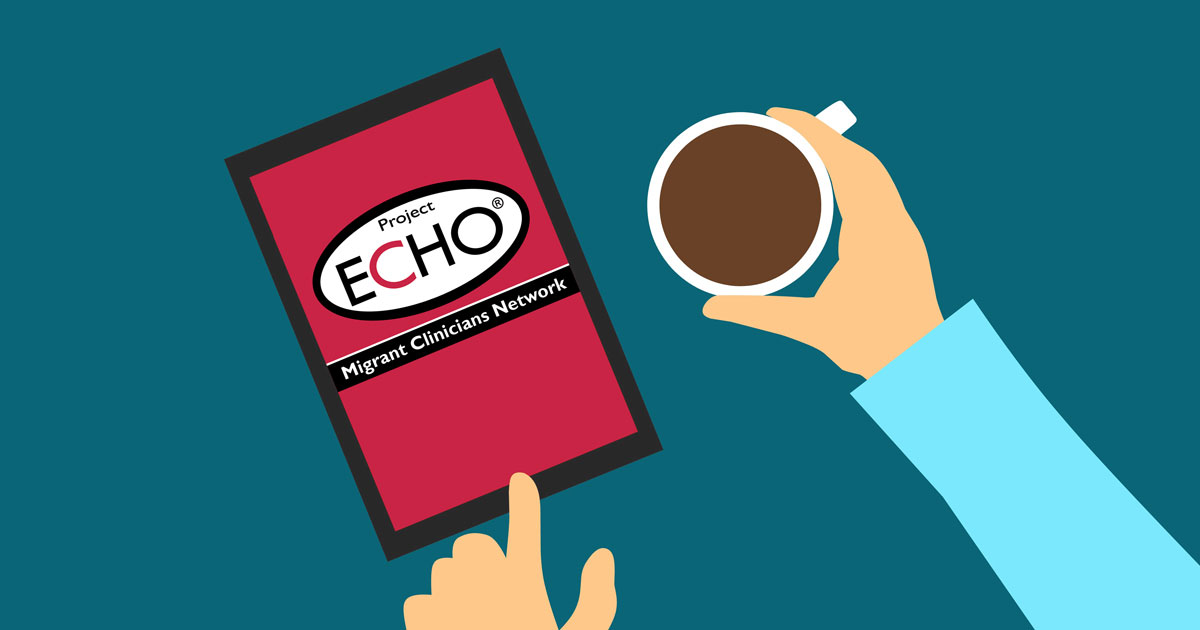- Who We Are
- Clinician Employment
- Publications
- Witness to Witness (W2W)
- Kugel & Zuroweste Health Justice Award
- Your Voice Matters: Photovoice Project
Straight To The Frontlines: Diabetes Experts Engage Directly with Community Health Workers in MCN’s Newest Project ECHO
Wed, 02/07/2018 | by Claire Hutkins Seda


A woman with a hemoglobin A1C of 9 struggles to change her diet with so little money, no education on cooking healthier foods, and no markets with fresh food in her neighborhood. Another woman, a migrant farmworker, had just barely gotten her diabetes under control before she moved for work to another state. When she returns a year later, she’s back to the starting point. At the Centers for Disease Control and Prevention (CDC), in research centers and education programs around the country, clinicians, researchers, and public health experts are producing important data on diabetes in the US and uncovering the best strategies to confront the chronic concern that plagues almost ten percent of the population. Meanwhile, community health workers, or promotores de salud, actively engage with people struggling to get their diabetes and hypertension under control. As the frontline workers and active members of the community, CHWs often provide respectful, culturally competent education and support directly to patients. Consequently, CHWs play a key role in empowering communities to shift habits to support better diabetes control. MCN’s newest Project ECHO, a six-month endeavor sponsored by the Health Resources and Services Administration (HRSA) seeks to connect the two groups to bring about better, faster outcomes for the nation’s millions of people suffering from diabetes and/or hypertension. The web-based series, with 27 participants representing eight health centers, is invitation-only, with the aim to reach CHWs from health centers around the country who struggle to assist patients to manage chronic diseases.
“This series is a labor of love. We know that some health centers haven’t been able to equip their patients to bring their A1C numbers down -- and we are confident that with greater tools and resources, and expert advice, we can have a lasting impression on patients’ outcomes,” said Alma Galván, Senior Program Manager for Migrant Clinicians Network and the coordinator and host for the series.
“Project ECHO is a unique model in that it isn’t just a webinar of experts telling others what to do -- it’s an educational model that emphasizes participation, peer learning, networking, and collaboration with the experts,” Galván said. “We are thrilled to have such a qualified and dedicated set of diabetes experts to engage with CHWs through this series.”
The first webinar at the end of January brought in Betsy Rodriguez, RN, MSN, CDE, Deputy Director of the CDC’s National Diabetes Education Program, to introduce the ECHO series, introduce the 25 participants to each other, and lay the groundwork for the sessions to come. She provided a presentation on the current state of diabetes and why it’s a critical chronic disease to address. Her presentation was followed by Jose Rodriguez, MD, Medical Director at Hospital General Castaner Castañer in Puerto Rico, who spoke about the history of health centers like his clinic, national cooperative agreements like MCN, and their place in addressing the diabetes crisis.
The second session, held last week, presented three ten-minute presentations led by diabetes experts, followed by extensive group discussion and questions. In the first presentation, Jessica Irizarry Ramos, MS, PhD, Chronic Disease Epidemiology Consultant with the CDC, spoke about depression and diabetes, emphasizing that one in three people with diabetes suffer from depression. The second presentation, by Ileana Maria Ponce-Gonzalez, MD, MPH, from the Community Health Worker Coalition for Migrants and Refugees and a former MCN staff member, made the connections between diabetes and mental health, from the links between mental health disorders and diabetes, to possible medicine interactions. Dr. Ponce-Gonzalez was followed by Dawit E. Demissie, MD, a physician at the Peninsula Regional Medical Center and with the Children’s National Health System. Dr. Demissie covered diabetes among children and adolescents, covering signs and symptoms, treatment, the special nature of adolescent patients, and further resources.
“First of all, I want to congratulate the presenters for being so brief in their presentation but, at the same time, so thorough, using a simple language that was easy to understand,” one participant commented, at the start of the question/answer and discussion session. “My question is: Is there a model to use in emotional support groups for people who have diabetes? Any model that is based on popular education where the culture of the participants is respected?”
The expert panel, joined by other expert faculty who provide support and perspective on days they aren’t presenting, then spent one hour addressing the concerns and real-life situations that CHW participants confront when serving their diverse populations.
“Sixty minutes of Q&A fly by when you have a strong and committed group sharing challenges, and expert faculty to respond,” said Galván. “Strong facilitation skills are handy when you do virtual discussion. It has taken me to a entire new level of facilitation.”
Like what you see? Amplify our collective voice with a contribution.
Got some good news to share? Contact us on our social media pages above.
Return to the main blog page or sign up for blog updates here.







